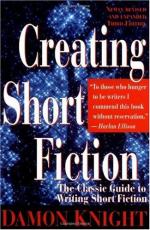
|
| Name: _________________________ | Period: ___________________ |
This test consists of 15 multiple choice questions and 5 short answer questions.
Multiple Choice Questions
1. What type of knowledge does Knight believe makes a good writer?
(a) No knowledge, only senses.
(b) General and broad knowledge.
(c) Knowledge in a specific field.
(d) Knowledge in many specific fields.
2. According to Knight, what have many writers never been taught?
(a) How to write.
(b) How to read.
(c) What genre they should write.
(d) Why they write.
3. What are the materials in a story?
(a) Plot and development.
(b) Characters and setting.
(c) Drive and motivation.
(d) Characters and tension.
4. What does the unconscious mind require?
(a) Bias.
(b) Stories.
(c) Information.
(d) Characters.
5. What is the result of a story without conflict, according to Knight?
(a) It has a weak plot.
(b) It has bad characters and setting.
(c) It has no appeal.
(d) It is a short story.
6. What can a writer observe to create empathy?
(a) Animals.
(b) Television.
(c) Blogs.
(d) People.
7. What was Tolstoy known for having?
(a) Forgetfulness.
(b) Acceptance.
(c) Tolerance.
(d) Empathy.
8. What does Knight describe as being the end of conflict?
(a) Epiphany.
(b) Plot.
(c) Impetus.
(d) Resolution.
9. When one sleeps, what can provide an answer to a story?
(a) Subconscious.
(b) Conscience.
(c) Conscious.
(d) Unconscious.
10. What stage of the developing writer will the writer get out of if he or she develops the main character?
(a) Stage 3.
(b) Stage 1.
(c) Stage 2.
(d) Stage 4.
11. What type of writing style does not require the conscious mind's work?
(a) Realism.
(b) Surrealism.
(c) Short story writing.
(d) Non-fiction.
12. What is the second stage of a developing writer?
(a) Story becomes trivial.
(b) Story becomes a plot.
(c) Story becomes famous.
(d) Story becomes insignificant.
13. What can a writer participate in, in order to learn about empathy?
(a) Computer games.
(b) Watching television.
(c) Reading.
(d) Roleplaying.
14. For Knight, which of the following is most useful in developing characters?
(a) Constraints.
(b) Self-reliance.
(c) Environment.
(d) Knowledge.
15. In what field does Knight specialize ?
(a) Non-fiction writing.
(b) Characterization.
(c) Literary devices.
(d) Short story writing.
Short Answer Questions
1. What does Knight believe is created by interest and energy?
2. According to Knight, what does fiction require to be believable?
3. Who wrote a story about a potentate whose wife died?
4. What does Knight claim can be used to summarize a theme?
5. What journey does Knight expect writers to take?
|
This section contains 366 words (approx. 2 pages at 300 words per page) |

|




